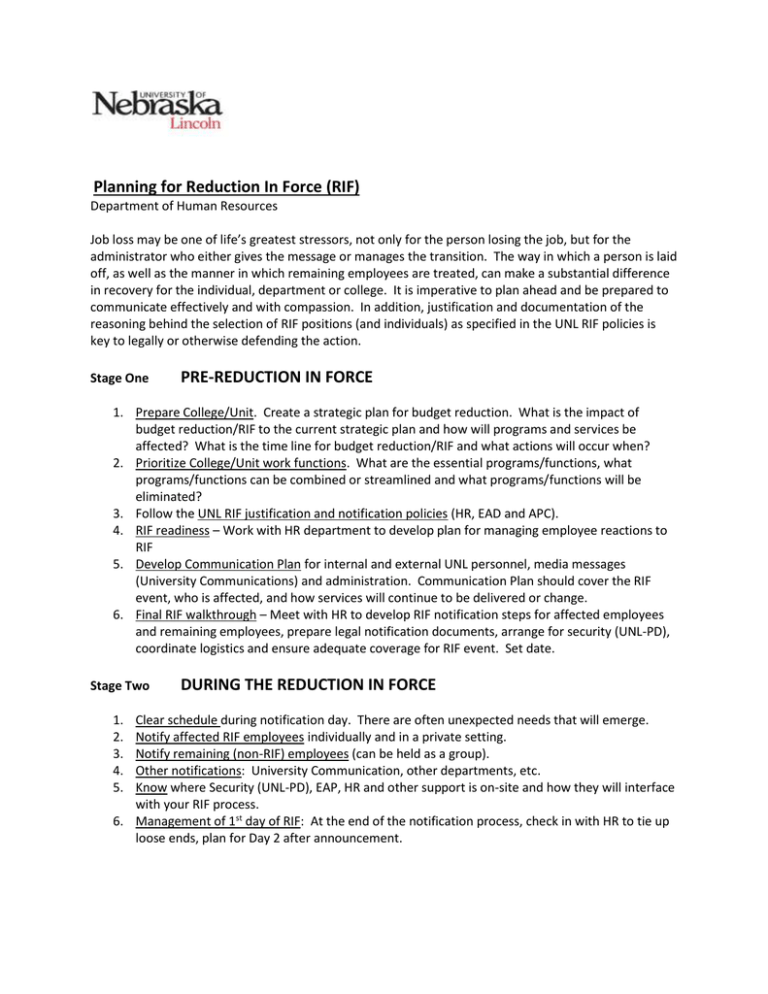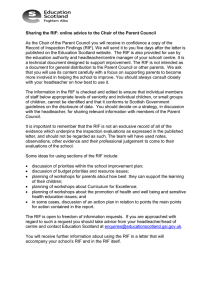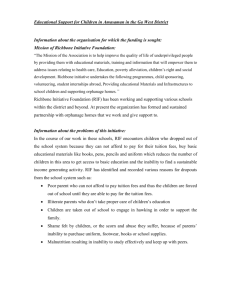Planning for Reduction In Force (RIF)
advertisement

Planning for Reduction In Force (RIF) Department of Human Resources Job loss may be one of life’s greatest stressors, not only for the person losing the job, but for the administrator who either gives the message or manages the transition. The way in which a person is laid off, as well as the manner in which remaining employees are treated, can make a substantial difference in recovery for the individual, department or college. It is imperative to plan ahead and be prepared to communicate effectively and with compassion. In addition, justification and documentation of the reasoning behind the selection of RIF positions (and individuals) as specified in the UNL RIF policies is key to legally or otherwise defending the action. Stage One PRE-REDUCTION IN FORCE 1. Prepare College/Unit. Create a strategic plan for budget reduction. What is the impact of budget reduction/RIF to the current strategic plan and how will programs and services be affected? What is the time line for budget reduction/RIF and what actions will occur when? 2. Prioritize College/Unit work functions. What are the essential programs/functions, what programs/functions can be combined or streamlined and what programs/functions will be eliminated? 3. Follow the UNL RIF justification and notification policies (HR, EAD and APC). 4. RIF readiness – Work with HR department to develop plan for managing employee reactions to RIF 5. Develop Communication Plan for internal and external UNL personnel, media messages (University Communications) and administration. Communication Plan should cover the RIF event, who is affected, and how services will continue to be delivered or change. 6. Final RIF walkthrough – Meet with HR to develop RIF notification steps for affected employees and remaining employees, prepare legal notification documents, arrange for security (UNL-PD), coordinate logistics and ensure adequate coverage for RIF event. Set date. Stage Two 1. 2. 3. 4. 5. DURING THE REDUCTION IN FORCE Clear schedule during notification day. There are often unexpected needs that will emerge. Notify affected RIF employees individually and in a private setting. Notify remaining (non-RIF) employees (can be held as a group). Other notifications: University Communication, other departments, etc. Know where Security (UNL-PD), EAP, HR and other support is on-site and how they will interface with your RIF process. 6. Management of 1st day of RIF: At the end of the notification process, check in with HR to tie up loose ends, plan for Day 2 after announcement. Stage Three POST- REDUCTION IN FORCE (one week – three months post RIF) 1. Management consultation – What went well, what didn’t, current issues to be addressed 2. Management of RIF employees during post-layoff working period (after they have received notice but are still required to work at UNL). Encourage RIF employees to utilize RIF support services for re-employment, benefits and financial/emotional assistance. 3. Management and motivation for non-RIF employees during post lay-off period. Ensure there is a smooth interface between RIF and non RIF employees in the work area. Distribute remaining workload from RIF employees to non-RIF employees. Work to re-engage non-RIF employees and rebuild morale. 4. Communicate plan to stakeholders about the newly restructured unit and how programs and services will be delivered. 5. Review Strategic Plan and goals, assess how post-RIF plan is evolving, identify progress and make adjustments as needed. Department of Human Resources (2011)

